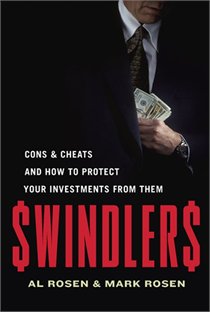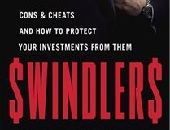“Canada is changing. There’s a return to yield games” and manipulation of operating cash flow, said Al Rosen on October 25, 2012. He was addressing about 40 people at a CFA Society Toronto luncheon seminar on the topic “Latest Trends in Financial Deception.” Rosen is co-founder of Accountability Research Corporation (ARC), the investment research arm of Rosen & Associates Limited, a forensic accounting firm, and co-author of Swindlers: Cons & Cheats and How To Protect Your Investments From Them published by Madison Commerce Press in 2010.
Rosen does not like the loose guidelines of the International Financial Reporting Standards (IFRS) in Canada. He paraphrased it thus: “invent your own [means of valuation] and find an auditor to go along with it.” He said the new guidelines give far too much freedom to management in defining what to report. He compared the previous accounting standard, Canadian GAAP (Generally Accepted Accounting Principles (Canada)), which was stricter than IFRS about realization of value through third party transactions and revenue-expense matching.
The IFRS-allowed “related party transactions” came under fire. Rosen likened such a transaction to “the right hand giving to the left hand—you can set any value you want.”
Rosen’s talk was accompanied by a printed list of 30 “Things to Watch For.” The list had an unwieldy mix of items. Some items could be immediately implemented by individual analysts. For example, item 3, “goodwill manipulation” and item 7, “uneven application of pension reporting standards,” could be searched for in a longitudinal comparison of a company’s financial statements by any analyst in the room. However, item 12, “the state of regulation in Canada” and item 18, “the inaction of lawmakers on white-collar crime” are big-picture items that are too broad for a single analyst to carry out. Perhaps the message needs to be brought to the lobbying arm of the CFA Society Toronto.
When pressed by an audience member to list specific “red flags” that he could take back and apply, Rosen listed four things to be wary of:
(1) Unrealistic interest rates on pension calculations
(2) Large swings in valuations
(3) Surprises hidden in the footnotes
(4) Differences between IFRS and previous accounting.
For item (4) Rosen said most annual reports will have a section that summarizes the accounting differences.
 Rosen zeroed in on one company, Just Energy Group, which ARC rates as “sell due to a number of accounting and financial reporting concerns.” He showed how the “base EBITDA” morphed into an “adjusted EBITDA” through the addition of selling and marketing expenses. Rosen’s steely eye glared at the audience. “Can anyone tell me why marketing expenses are considered an asset?” he asked.
Rosen zeroed in on one company, Just Energy Group, which ARC rates as “sell due to a number of accounting and financial reporting concerns.” He showed how the “base EBITDA” morphed into an “adjusted EBITDA” through the addition of selling and marketing expenses. Rosen’s steely eye glared at the audience. “Can anyone tell me why marketing expenses are considered an asset?” he asked.
ARC also rated CML Healthcare and Enerplus Corporation as “sell” for reasons that Rosen did not have time to elaborate on.
A separate hand-out warned the audience to especially be on the lookout for the “Big Ponzi” looming. We close this posting on a quotation from the ARC paper:
The “Big Ponzi” is that many Canadian companies currently have overstated assets, understated liabilities, less equity, less cash flow from operations, and on and on. They need fresh cash to survive because they are fundamentally not generating adequate cash profits. Dividends are too often being paid from borrowings and new stock issues. Classic Pyramids and Ponzis.
“Directors are not properly overseeing,” said Rosen. “Only the analysts.” ª
Further research can be found at the ARC web site: http://www.accountabilityresearch.com/advisor/index.php/research
Two articles particularly relevant to the October 25 seminar are:
“Turning Against IFRS”: http://www.advisor.ca/news/industry-news/turning-against-ifrs-73378
“Deception of a different kind”: http://www.accountabilityresearch.com/advisor/index.php/media/item/314-deception-of-a-different-kind-when-companies-use-accounting-to-make-profits-look-bad

